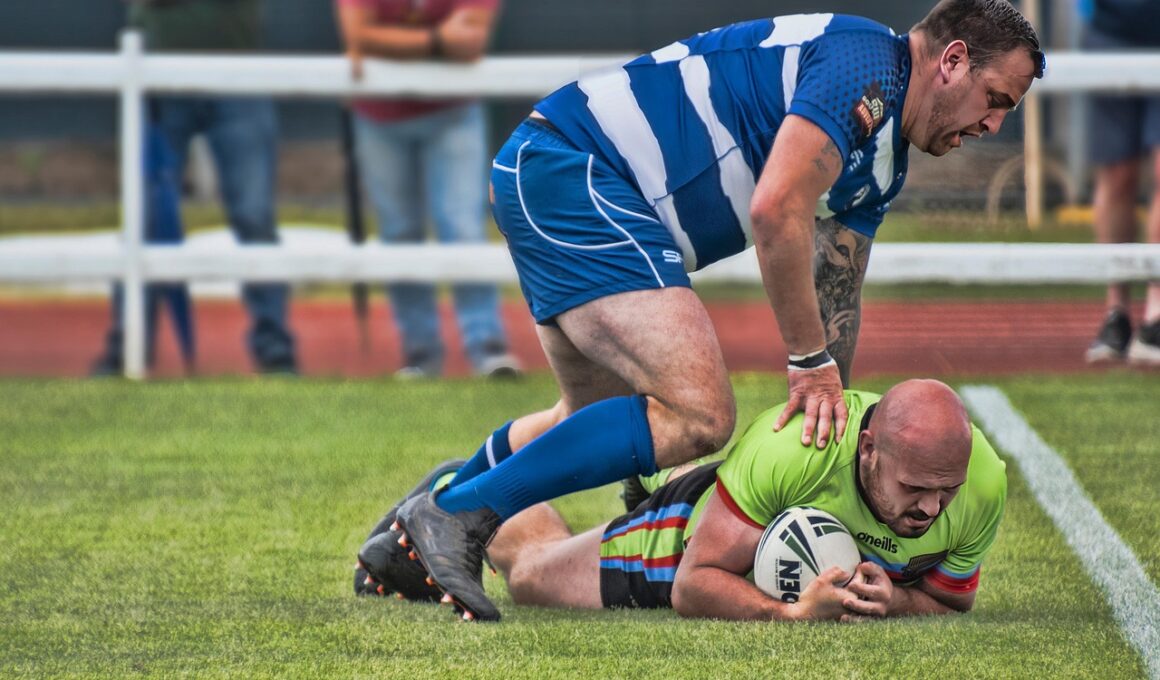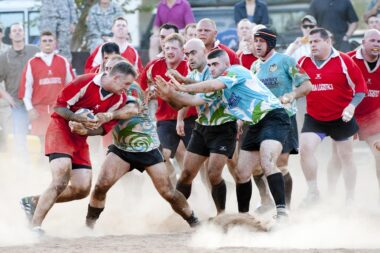Essential Fitness Tips for Rugby Players
Rugby is a demanding sport that requires a high level of fitness, strength, and endurance. To maximize performance, rugby players should focus on several essential fitness tips tailored to their unique demands. Firstly, developing a strong cardiovascular base is crucial. Include activities like running, swimming, and cycling in training routines. This will enhance stamina and support sustained performances during matches. Additionally, strength training should be prioritized, specifically targeting core, legs, and upper body. Using compound movements such as squats and deadlifts will build overall strength. Incorporating plyometric exercises can also improve explosive power, which is vital for successfully tackling opponents and sprinting. Moreover, flexibility and mobility work are essential to prevent injuries. Implementing regular stretching routines and dynamic warm-ups will benefit long-term performance. Rest and recovery practices cannot be overlooked; adequate sleep and nutrition play roles in sustainable athleticism. Nutrition should include a balance of carbohydrates, proteins, and fats. Therefore, players need to adjust their diet according to training intensity. Supplementing hydration is equally important and should be practiced continuously. Hydrating before, during, and after workouts will significantly enhance recovery and performance.
Another aspect of fitness for rugby players is the development of sport-specific skills. Practical training should combine fitness routines with skill drills. Workouts should combine tackling, passing, and strategic plays. These not only build muscle memory but also allow conditioning to happen concurrently. Engaging in scrimmages and open play is also beneficial. Such practice enhances game awareness and tactical skills. Moreover, implementing high-intensity interval training (HIIT) into conditioning routines can mimic match scenarios, keeping fitness levels sharp and game-ready. With the right combination of fitness and skill training, players can have an edge on the field. Additionally, emphasis should be placed on mental resilience. Rugby is as much a mental challenge as a physical one; techniques to improve focus, reduce anxiety, and maintain confidence can significantly impact performance. Mindfulness and visualization techniques are fantastic ways to enhance mental strength. Furthermore, setting personal fitness goals can help track progress, providing motivation to continuously improve. Recovery strategies, such as massage, foam rolling, and ice baths, should be implemented alongside rigorous training. Incorporating the right recovery tools enhances overall longevity in the sport, enabling players to maintain peak fitness levels throughout the season.
Nutrition and Supplementation
Nutrition plays a vital role in a rugby player’s fitness journey. Correctly fueling the body is fundamental for optimal performance and recovery. To start with, players should aim for a diet rich in whole foods. Foods such as lean proteins, whole grains, fruits, and vegetables provide the necessary vitamins and minerals essential for overall health. Proteins, in particular, help repair muscles after intense training sessions. Therefore, athletes should focus on adequate protein intake post-workouts to promote muscle recovery. Moreover, carbohydrates serve as a primary energy source, and they should not be neglected. Complex carbohydrates found in oats, sweet potatoes, and brown rice provide long-lasting energy necessary for rugby training. Besides, hydration levels must remain consistently high. Water supports various bodily functions, including temperature regulation and nutrient transportation. Players should be aware of dehydration symptoms and respond promptly. Moreover, sports drinks can be useful during prolonged activities to replenish electrolytes lost through sweat. As for supplementation, it can be helpful when dietary intake is insufficient. Supplements like protein powders and omega-3 fatty acids can boost nutrition, but it’s crucial to consult with a nutritionist before starting any regimen.
Another critical factor in rugby fitness is the importance of periodization in training. Periodization refers to the systematic planning of athletic training. Focusing on different training goals during specific times maximizes performance and keeps athletes engaged. A well-structured program alternates between strength training, endurance work, and recovery phases. Such diversity in training prevents overuse injuries and mental burnout. To successfully implement periodization, it may be beneficial to consult a certified coach. They can provide insights and tailor programs to individual player needs. For instance, off-season training can focus on building strength and muscle mass, while pre-season should emphasize agility and speed. During the in-season, maintaining fitness levels while allowing for appropriate recovery is essential. Rest days should be strategically placed to maximize training benefits without compromising performance. Players should also utilize performance tracking methods. Monitoring metrics like heart rate, training volume, and recovery will guide adjustments in training intensity. These practices ensure that resources are allocated to areas that need improvement while preparing for the demands of competition. Adopting a holistic approach to training is essential for anyone looking to excel in the world of rugby.
The Importance of Recovery
Recovery is often overlooked but is essential to a rugby player’s fitness. Ensuring adequate recovery times can prevent injuries, enhance performance, and improve overall well-being. After intense training sessions, the body requires time to repair and strengthen itself. Active recovery techniques, like light aerobic exercises or yoga, can help enhance blood flow, facilitating recovery. Moreover, sleep greatly contributes to recovery and should not be underestimated. Aim for an average of 7-9 hours of quality sleep each night. During sleep, the body releases growth hormones that foster muscle repair. Additionally, nutritional support during recovery is crucial. Athletes should consume a meal rich in carbohydrates and protein within a window of 30 minutes post-training. This helps replenish glycogen stores while encouraging muscle repair. Furthermore, ice baths and compression garments can mitigate soreness and inflammation in the muscles. As players get older, adopting a recovery-focused mindset becomes critical for longevity in the sport. Integrating self-care practices in daily routines, such as regular massage therapy or foam rolling, will also enhance recovery. Those who prioritize recovery will see significant gains in performance over time as their bodies adapt more thoroughly.
Lastly, incorporating mental training is integral to enhancing overall fitness for rugby players. Maintaining peak physical shape is undeniably crucial, but mental toughness is the backbone of athletic performance. Techniques such as visualization and goal-setting help cultivate a winning attitude. Players should visualize executing plays successfully. Furthermore, they must set realistic and achievable fitness goals tailored to their abilities and competition levels. This will foster motivation as progress is seen. Additionally, mental resilience can be strengthened through mindfulness practices. Engaging in meditation can improve focus, boost confidence, and lower anxiety levels, equipping athletes with tools required during high-pressure situations. Furthermore, developing a support system with peers, coaches, and mentors can provide encouragement throughout the training journey. This network allows players to share experiences, which can also enhance mental clarity. Journaling training progress alongside emotional states is another useful tool to identify patterns and adjust mental strategies. In summary, bridging physical and mental training is the key to achieving excellence in rugby. By focusing on the interplay between both aspects, rugby players can thrive and reach their full potential on and off the field.
In conclusion, the fitness journey for rugby players involves various aspects. From nutrition and hydration to training regimens and recovery strategies, every area plays a role in performance. Focusing on cardiovascular conditioning, strength training, flexibility, and mental toughness create a solid foundation for success. Moreover, adopting well-structured periodization and nurturing recovery will help to maintain peak fitness throughout the rugby season. Players must pay attention to their diet, ensuring nutrient-rich foods and recovery practices are integrated. Nutrition drives energy levels and muscle recovery, impacting performance significantly. It’s also essential to stay hydrated to support bodily functions. Furthermore, focusing on sport-specific skills and techniques while enhancing fitness levels leads to improvement in performance. Rugby players often face physical and mental challenges; therefore, strategies to cultivate resilience, motivation, and confidence are invaluable. Overall, dedication and a multi-faceted approach will lead players closer to achieving their goals. Investing time into fitness will not only boost on-field performance but will also improve the overall enjoyment of the sport. Conclusively, rugby is not just about physical prowess but psychological resilience and strategic thinking. Undoubtedly, implementing these essential fitness tips will be fruitful.





